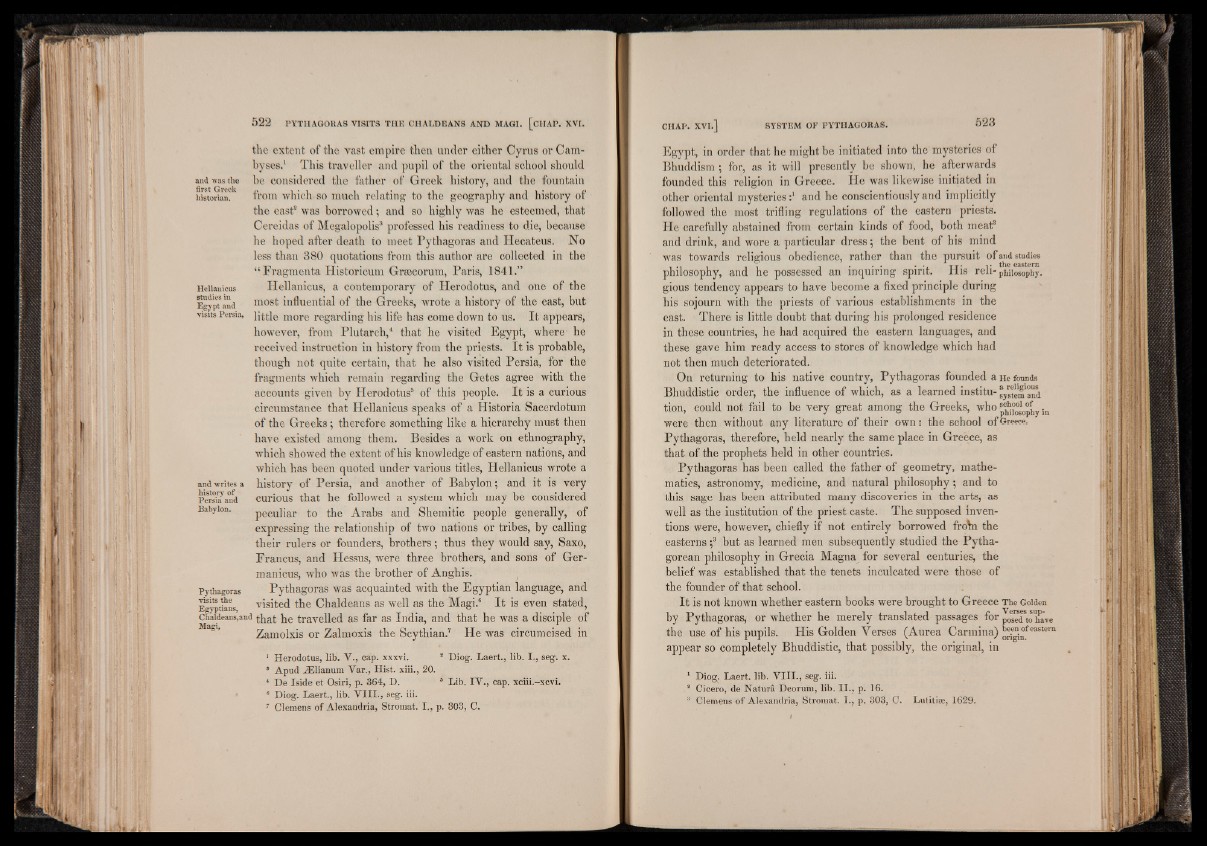
the extent of the vast empire then under either Cyrus or Cam-
byses.1 This traveller and pupil of the oriental school should
and was the be considered the father of Greek history, and the fountain
historian. from which so much relating to the geography and history of
the east* was borrowed; and so highly was he esteemed, that
Cereidas of Megalopolis3 professed his readiness to die, because
he hoped after death to meet Pythagoras and Hecateus. No
less than 380 quotations from this author are collected in the
“ Fragmenta Historicum Grsecorum, Paris, 1841.”
Hellanicus Hellanicus, a contemporary of Herodotus, and one of the
Earm and most influential of the Greeks, wrote a history of the east, but
visits Persia, little more regarding his life has come down to us. It appears,
however, from Plutarch,4 that he visited Egypt, where he
received instruction in history from the priests. It is probable,
though not quite certain, that he also visited Persia, for the
fragments which remain regarding the Getes agree with the
accounts given by Herodotus5 of this people. It is a curious
circumstance that Hellanicus speaks of a Historia Sacerdotum
of the Greeks; therefore something like a hierarchy must then
have existed among them. Besides a work on ethnography,
which showed the extent of his knowledge of eastern nations, and
which has been quoted under various titles, Hellanicus wrote a
and writes a history of Persia, and another of Babylon; and it is very
PeiSfand curious that he followed a system which may be considered
Babylon. peculiar to the Arabs and Shemitic people generally, of
expressing the relationship of two nations or tribes, by calling
their rulers or founders, brothers; thus they would say, Saxo,
Francus, and Hessus, were three brothers, and sons of Ger-
manicus, who was the brother of Anghis.
Pythagoras Pythagoras was acquainted with the Egyptian language, and
Syptlans, visited the Chaldeans as well as the Magi.6 It is even stated,
Chaldeans,and he travelled as far as India, and that he was a disciple of
Zamolxis or Zalmoxis the Scythian.7 He was circumcised in
1 Herodotus, lib. V., cap. xxxvi. ! Diog. Laert., lib. I., seg. x.
* Apud JElianum Var., Hist, xiii., 20.
4 De Iside et Osiri, p. 364, D. s Lib. IV ., cap. xciii.-xcvi.
* Diog. Laert., lib. V I I I ., seg. iii.
7 Clemens of Alexandria, Stromat. I ., p. 803, C.
Egypt, in order that he might be initiated into the mysteries of
Bhuddism; for, as it will presently be shown, he afterwards
founded this religion in Greece. He was likewise initiated in
other oriental mysteriesand he conscientiously and implicitly
followed the most trifling regulations of the eastern priests.
He carefully abstained from certain kinds of food, both meat8
and drink, and wore a particular dress; the bent of his mind
was towards religious obedience, rather than the pursuit of and studies
philosophy, and he possessed an inquiring spirit. His reli- philosophy,
gious tendency appears to have become a fixed principle during
his sojourn with the priests of various establishments in the
east. There is little doubt that during his prolonged residence
in these countries, he had acquired the eastern languages, and
these gave him ready access to stores of knowledge which had
not then much deteriorated.
On returning to his native country, Pythagoras founded a He founds
Bhuddistic order, the influence of which, as a learned institu- j^tem and
tion, could not fail to be very great among the Greeks, wh° p^gopty ¡n
were then without any literature of their own: the school of Greece.
Pythagoras, therefore, held nearly the same place in Greece, as
that of the prophets held in other countries.
Pythagoras has been called the father of geometry, mathematics,
astronomy, medicine, and natural philosophy; and to
this sage has been attributed many discoveries in the arts, as
well as the institution of the priest caste. The supposed inventions
were, however, chiefly if not entirely borrowed from the
easterns ;3 but as learned men subsequently studied the Pythagorean
philosophy in Grecia Magna for several centuries, the
belief was established that the tenets inculcated were those of
the founder of that school.
It is not known whether eastern books were brought to Greece The Golden
by Pythagoras, or whether he merely translated passages for po^^Ttohave
the use of his pupils. His Golden Verses (Aurea Carmina) ^e^ feastem
appear so completely Bhuddistic, that possibly, the original, in
1 Diog. Laert. lib. V I I I ., seg. iii.
a Cicero, de Natura Deorum, lib. I I ., p. 16.
3 Clemens of Alexandria, Stromat. I., p. 303, C. Lutitiee, 1629.